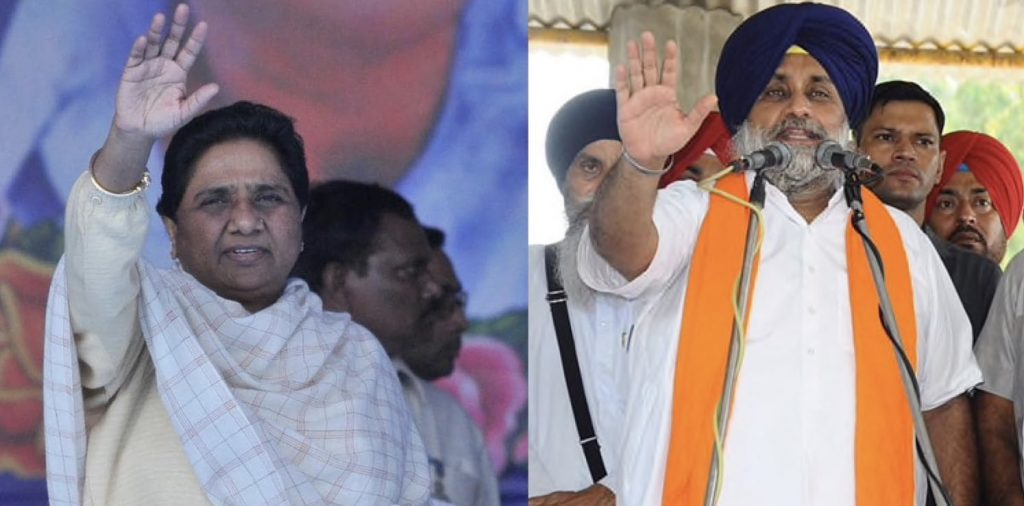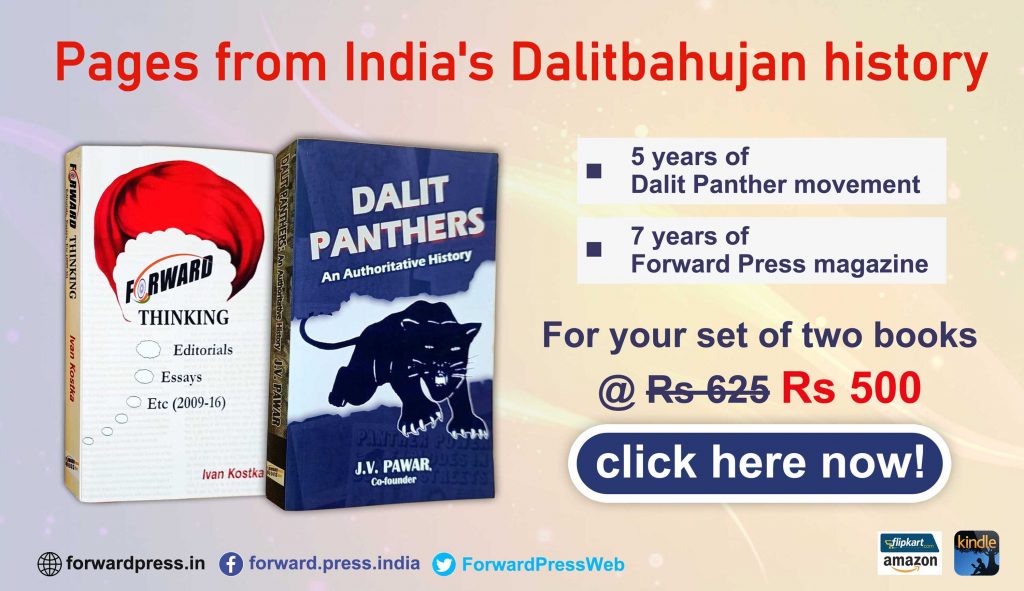The Shiromani Akali Dal (SAD) is a Sikh heritage political party of Punjab. The Bahujan Samaj Party (BSP), the newly announced alliance partner of SAD, also originated in Punjab, where Dalits comprise a third of its population, but it blossomed in Uttar Pradesh. Both SAD and BSP are currently entangled in adverse political circumstances. The SAD is finding it difficult to maintain its heritage status. Despite being a party of the Sikhs, it is now suffering the consequences of not defending the interests of its core support base, the farmers of the state who are mostly Jat Sikhs. On the other hand, the BSP has been experiencing an existential crisis in its birthplace for some time.
The SAD was a partner in the National Democratic Alliance (NDA) when the NDA government at the Centre rushed through three controversial agriculture-related bills in Parliament in the middle of the pandemic last year. This has led to SAD losing its constituency. Punjab’s Dalits, though largely landless agricultural workers, have also felt the adverse impact of the laws on their lives. Thus, landowning farmers and landless Dalit farmworkers, otherwise locked in a caste and class contradiction, have been brought close to each other in joint protest against the contentious farm laws. The “farmers’ protest” has elicited good response from the various Khet Mazdoor (agricultural workers) unions in Punjab. The protest has transcended narrow ethnic boundaries and realized an unprecedented wider Kisan-Mazdoor political unity. To negate the political impact of this newfound Kisan-Mazdoor political unity on its electoral performance in the forthcoming assembly election in Punjab, the SAD has astutely inked an electoral alliance with the BSP in the hope of garnering votes from the large Scheduled Castes (SCs) population in Punjab, which is mostly concentrated in the Doaba region – namely Jalandhar, Nawanshahr, Kapurthala and Hoshiarpur districts. Earlier, it had severed its ties with the Bharatiya Janata Party (BJP)-led National Democratic Alliance (NDA) over the hastily enacted farm laws.
The SAD and BSP stakeholders have divergent opinions on the efficacy of the alliance announced on 12 June 2021. The Akalis are banking on the SCs, that is a third of the state’s population, for a new lease of political life. However, SCs aren’t particularly thrilled at the forging of this alliance. Their disappointment came out in the open immediately after the formal announcement of the alliance by Sukhbir Singh Badal, pesident of SAD, and Satish Chandra Mishra, the non-Dalit general secretary of BSP and confidant of Mayawati, the BSP matriarch. The irony was that the party had failed to produce a leader from among the large SC population of the state who could join the SAD chief in announcing the alliance.
Also Read: The farmers’ protest and the new Shudra consciousness
The local office bearers of the Punjab unit of the BSP expressed their disappointment over the seat-sharing arrangement between the SAD and BSP. The BSP not only got less seats (20)[1] than the SAD’s previous ally, the BJP (23), but was also allegedly deprived of those constituencies where its candidates have performed relatively well in previous assembly and Lok Sabha elections. They urged the BSP leadership “to get the seat sharing pact revised so that the reserved seats like Phillaur, Banga, Adampur and Chabbewal could be allotted to BSP.”[2] The three assembly constituencies of Phillaur, Banga, and Adampur – presently represented by SAD MLAs who were earlier affiliated with the BSP – are among those in the Doaba region of Punjab where the BSP stands a chance. In the 2019 Lok Sabha elections, BSP secured more votes than SAD in these three assembly segments. The cadres of the Punjab unit of BSP also made their disappointment known over the exclusion of four more assembly constituencies (Sham Chaurasi, Chabbewal, Garhshankar and Balachaur) where the party has made its presence felt. Moreover, in some of the allotted constituencies – Amritsar North, Amritsar Central, Pathankot, Bhoa, Bassi Pathana and Payal – the BSP has failed to get even a thousand votes in the previous assembly elections. Punjab has 34 assembly constituencies reserved for the SCs and only eight of these constituencies have been allotted to BSP.
It is too early to predict how smoothly this newly formed political alliance will work – if at all – but a cursory look at the socio-political and socio-economic ground reality is insightful. It is a common perception that Jat Sikhs and SCs have almost similar numerical strength, each being a third of the population of the state, but there is a massive gulf between the two communities in terms of agricultural-land ownership. The majority of Jat Sikhs are landowners, though in different measures, whereas there is an overwhelming preponderance of SCs among the manual agricultural workers who work the lands of the Jat Sikhs. This economic disparity only adds to the caste divide. In rural Punjab, the SCs live in segregated socio-spatial settlements derogatorily called the Chamarlee in Doaba, Thathee in Malwa, and Vehra in Majha – the three distinct spatial-cultural regions of the state. Jat Sikhs live in the main part of the village along with the other castes of the four Varnas. The SCs and Jats have, sadly, separate places of worship and even separate cremation grounds in the villages.
Given this caste divide, it is quite unlikely that the SC votes will be transferred wholesale to the SAD merely because of its political alliance with the Mayawati-headed BSP. Moreover, the SCs of Punjab, like their counterparts in other parts of the country, are not a homogeneous category – they are divided into 39 castes among themselves and further fragmented into different religions and syncretic faiths, metamorphosed into Deras. Dalits, atomized into various castes, religions and Deras, are respectively aligned with different political parties and socio-cultural outfits in the state. The SAD-BSP alliance may not fetch substantial SC votes across the entire spectrum within the Dalit community. Similarly, even Sikhs, given their clan affiliations with a Sikh-headed Punjab Congress party and other Akali Dals, have never voted exclusively for the SAD.[3] At the same time, those SCs who had been estranged from the BSP for its failure to live up to the legacy of Kanshi Ram, the founder of the BSP, and had become sympathizers of SAD, may withdraw their support precisely because of its alliance with the BSP. Similarly, the BSP may also have to pay the price for allying with the SAD. Many of its supporters may prefer to dissociate themselves from this political marriage of convenience. This attitude is likely to be present, to a greater or lesser extent, across the sub-groups and castes upon which this alliance is predicated. It is thus well within the realm of possibility that this alliance that is a result of seemingly clever vote-bank calculations may be undermined by deep scepticism and suspicion.

However, this is not the first time there has been a SAD-BSP alliance. The SAD and BSP came together for the first time in 1996 to contest Punjab’s 13 Lok Sabha seats. They won 11 seats – SAD won eight out of nine and BSP, three out of four. Kanshi Ram, then the BSP supremo, himself was one the three victorious BSP candidates. He won from the Hoshiarpur reserved constituency. However, the alliance did not last long, as Parkash Singh Badal, then president of the SAD, unilaterally decided to support the BJP-led Atal Bihari Vajpayee government at the Centre. Kanshi Ram accused Parkash Singh Badal of breaking the alliance and called him “manuvadi”.[4] Subsequently, he formed an electoral alliance with the Sarav Hind Shiromani Akali Dal (Tohra), which played a significant role in the defeat of SAD in the 2002 Punjab Assembly elections. In 2016, Mayawati called the SAD-BJP government “anti-Dalit” during a huge rally at Nawanshahr on Kanshi Ram’s birth anniversary.[5]
Since 1996, much water has flown under the bridge. Except for the lone assembly seat of Garhshankar won by Shingara Ram Sahungra in 1997, the BSP has not won any seats in either the assembly elections or the parliament elections in the state in the past 25 years. Its share in the total votes polled during the last five Assembly elections (1997, 2002, 2007, 2012, and 2017) varies between 13.28 per cent to 1.59 per cent.[6] Its only impressive electoral performance was the first time it entered the fray – in the 1992 assembly elections, boycotted by SAD. It won nine seats with 16.68 per cent votes. The BSP has never achieved that figure since. The last assembly elections, in 2017, were a disaster as far as the BSP was concerned. Except Avtar Singh Karimpuri, former president of the Punjab unit of BSP, all its other 110 candidates forfeited their security deposits. Its vote share dropped precipitously to an all-time low of 1.59 per cent. In the 2012 assembly elections, its performance was relatively less abysmal with a vote share of 4.3 per cent. Out of its 117 candidates, 109 forfeited their security deposits. Though SCs constitute almost a third of the state population, the divisions among them have so far torpedoed the BSP’s ambition to emerge as a mainstream political party in Punjab. Whether the SAD-BSP alliance proves to be mutually beneficial or mutually destructive – given the complex interplay of the aforesaid factors – will be one of the keenly followed aspects of the 2022 Punjab Assembly elections.
[1] Eight from the Dalit-dominated Doaba region, seven from the Malwa region, and five from the Majha region.
[2] Singh, I.P. “SAD tie-up cheers BSP cadres, but ‘quality’ of seats vexes them”. The Times of India, 14 June 2021. See also: The Tribune, 14 June 2021.
[3] Kumar, Ashutosh. “Punjab Is in Bad Need of Political Leadership: Will Optics Reap Dividends?”. The Wire, 14 June 2021. Available at: https://thewire.in/politics/will-optics-reap-dividends-in-a-punjab-in-bad-need-of-political-leadership (Accessed on 14 June 2021).
[4] Awasthi, Surinder. “Kanshi formalizes poll alliance with Tohra group,”. The Times of India, 1 July 1999.
[5] Kohli, Jatinder. “BSP to go it alone in 2017 Punjab polls: Mayawati in Nawanshahr”. Hindustan Times, 15 March 2016. Available at:https://www.hindustantimes.com/punjab/no-alliance-will-fight-2017-punjab-polls-alone-mayawati-in-nawashahr/story-xvgQ1XSbk8oJZC656XmF2J.html (Accessed on June 14, 2021).
[6] Gopal, Navjeevan. “Explained: Why SAD is counting on its alliance with BSP for a comeback”. The Indian Express, 14 June 2021. Available at: https://indianexpress.com/article/explained/why-sad-is-counting-on-its-alliance-with-bsp-for-a-comeback-7356346/lite/ (Accessed on 14 June 2021).
Copy-editing: Anil






